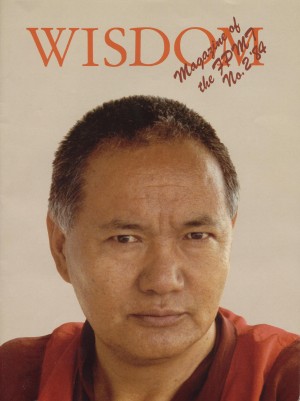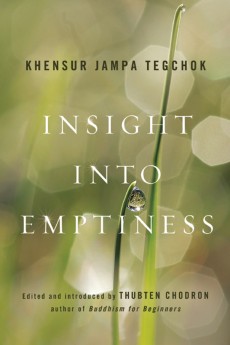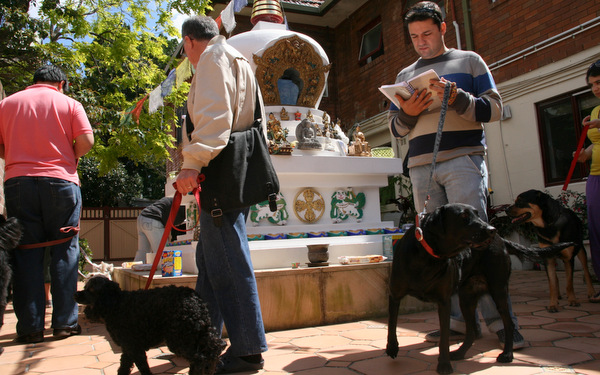- Home
- FPMT Homepage
Foundation for the Preservation of the Mahayana Tradition
The FPMT is an organization devoted to preserving and spreading Mahayana Buddhism worldwide by creating opportunities to listen, reflect, meditate, practice and actualize the unmistaken teachings of the Buddha and based on that experience spreading the Dharma to sentient beings. We provide integrated education through which people’s minds and hearts can be transformed into their highest potential for the benefit of others, inspired by an attitude of universal responsibility and service. We are committed to creating harmonious environments and helping all beings develop their full potential of infinite wisdom and compassion. Our organization is based on the Buddhist tradition of Lama Tsongkhapa of Tibet as taught to us by our founders Lama Thubten Yeshe and Lama Thubten Zopa Rinpoche.
- Willkommen
Die Stiftung zur Erhaltung der Mahayana Tradition (FPMT) ist eine Organisation, die sich weltweit für die Erhaltung und Verbreitung des Mahayana-Buddhismus einsetzt, indem sie Möglichkeiten schafft, den makellosen Lehren des Buddha zuzuhören, über sie zur reflektieren und zu meditieren und auf der Grundlage dieser Erfahrung das Dharma unter den Lebewesen zu verbreiten.
Wir bieten integrierte Schulungswege an, durch denen der Geist und das Herz der Menschen in ihr höchstes Potential verwandelt werden zum Wohl der anderen – inspiriert durch eine Haltung der universellen Verantwortung und dem Wunsch zu dienen. Wir haben uns verpflichtet, harmonische Umgebungen zu schaffen und allen Wesen zu helfen, ihr volles Potenzial unendlicher Weisheit und grenzenlosen Mitgefühls zu verwirklichen.
Unsere Organisation basiert auf der buddhistischen Tradition von Lama Tsongkhapa von Tibet, so wie sie uns von unseren Gründern Lama Thubten Yeshe und Lama Thubten Zopa Rinpoche gelehrt wird.
- Bienvenidos
La Fundación para la preservación de la tradición Mahayana (FPMT) es una organización que se dedica a preservar y difundir el budismo Mahayana en todo el mundo, creando oportunidades para escuchar, reflexionar, meditar, practicar y actualizar las enseñanzas inconfundibles de Buda y en base a esa experiencia difundir el Dharma a los seres.
Proporcionamos una educación integrada a través de la cual las mentes y los corazones de las personas se pueden transformar en su mayor potencial para el beneficio de los demás, inspirados por una actitud de responsabilidad y servicio universales. Estamos comprometidos a crear ambientes armoniosos y ayudar a todos los seres a desarrollar todo su potencial de infinita sabiduría y compasión.
Nuestra organización se basa en la tradición budista de Lama Tsongkhapa del Tíbet como nos lo enseñaron nuestros fundadores Lama Thubten Yeshe y Lama Zopa Rinpoche.
A continuación puede ver una lista de los centros y sus páginas web en su lengua preferida.
- Bienvenue
L’organisation de la FPMT a pour vocation la préservation et la diffusion du bouddhisme du mahayana dans le monde entier. Elle offre l’opportunité d’écouter, de réfléchir, de méditer, de pratiquer et de réaliser les enseignements excellents du Bouddha, pour ensuite transmettre le Dharma à tous les êtres. Nous proposons une formation intégrée grâce à laquelle le cœur et l’esprit de chacun peuvent accomplir leur potentiel le plus élevé pour le bien d’autrui, inspirés par le sens du service et une responsabilité universelle. Nous nous engageons à créer un environnement harmonieux et à aider tous les êtres à épanouir leur potentiel illimité de compassion et de sagesse. Notre organisation s’appuie sur la tradition guéloukpa de Lama Tsongkhapa du Tibet, telle qu’elle a été enseignée par nos fondateurs Lama Thoubtèn Yéshé et Lama Zopa Rinpoché.
Visitez le site de notre Editions Mahayana pour les traductions, conseils et nouvelles du Bureau international en français.
Voici une liste de centres et de leurs sites dans votre langue préférée
- Benvenuto
L’FPMT è un organizzazione il cui scopo è preservare e diffondere il Buddhismo Mahayana nel mondo, creando occasioni di ascolto, riflessione, meditazione e pratica dei perfetti insegnamenti del Buddha, al fine di attualizzare e diffondere il Dharma fra tutti gli esseri senzienti.
Offriamo un’educazione integrata, che può trasformare la mente e i cuori delle persone nel loro massimo potenziale, per il beneficio di tutti gli esseri, ispirati da un’attitudine di responsabilità universale e di servizio.
Il nostro obiettivo è quello di creare contesti armoniosi e aiutare tutti gli esseri a sviluppare in modo completo le proprie potenzialità di infinita saggezza e compassione.
La nostra organizzazione si basa sulla tradizione buddhista di Lama Tsongkhapa del Tibet, così come ci è stata insegnata dai nostri fondatori Lama Thubten Yeshe e Lama Zopa Rinpoche.
Di seguito potete trovare un elenco dei centri e dei loro siti nella lingua da voi prescelta.
- 欢迎 / 歡迎
简体中文
“护持大乘法脉基金会”( 英文简称:FPMT。全名:Foundation for the Preservation of the Mahayana Tradition) 是一个致力于护持和弘扬大乘佛法的国际佛教组织。我们提供听闻,思维,禅修,修行和实证佛陀无误教法的机会,以便让一切众生都能够享受佛法的指引和滋润。
我们全力创造和谐融洽的环境, 为人们提供解行并重的完整佛法教育,以便启发内在的环宇悲心及责任心,并开发内心所蕴藏的巨大潜能 — 无限的智慧与悲心 — 以便利益和服务一切有情。
FPMT的创办人是图腾耶喜喇嘛和喇嘛梭巴仁波切。我们所修习的是由两位上师所教导的,西藏喀巴大师的佛法传承。
繁體中文
護持大乘法脈基金會”( 英文簡稱:FPMT。全名:Found
ation for the Preservation of the Mahayana Tradition ) 是一個致力於護持和弘揚大乘佛法的國際佛教組織。我們提供聽聞, 思維,禪修,修行和實證佛陀無誤教法的機會,以便讓一切眾生都能 夠享受佛法的指引和滋潤。 我們全力創造和諧融洽的環境,
為人們提供解行並重的完整佛法教育,以便啟發內在的環宇悲心及責 任心,並開發內心所蘊藏的巨大潛能 — 無限的智慧與悲心 – – 以便利益和服務一切有情。 FPMT的創辦人是圖騰耶喜喇嘛和喇嘛梭巴仁波切。
我們所修習的是由兩位上師所教導的,西藏喀巴大師的佛法傳承。 察看道场信息:
- FPMT Homepage
- News/Media
-
- Study & Practice
-
-
- About FPMT Education Services
- Latest News
- Programs
- New to Buddhism?
- Buddhist Mind Science: Activating Your Potential
- Heart Advice for Death and Dying
- Discovering Buddhism
- Living in the Path
- Exploring Buddhism
- FPMT Basic Program
- FPMT Masters Program
- FPMT In-Depth Meditation Training
- Maitripa College
- Lotsawa Rinchen Zangpo Translator Program
- Universal Education for Compassion & Wisdom
- Online Learning Center
-
- Prayers & Practice Materials
- Overview of Prayers & Practices
- Full Catalogue of Prayers & Practice Materials
- Explore Popular Topics
- Benefiting Animals
- Chenrezig Resources
- Death & Dying Resources
- Lama Chopa (Guru Puja)
- Lama Zopa Rinpoche: Compendium of Precious Instructions
- Lama Zopa Rinpoche: Life Practice Advice
- Lama Zopa Rinpoche Practice Series
- Lamrim Resources
- Mantras
- Prayer Book Updates
- Purification Practices
- Sutras
- Thought Transformation (Lojong)
- Audio Materials
- Dharma Dates - Tibetan Calendar
- Translation Services
- Publishing Services
- Ways to Offer Support
- Prayers & Practice Materials
-
- Teachings and Advice
- Find Teachings and Advice
- Lama Zopa Rinpoche Advice Page
- Lama Zopa Rinpoche: Compendium of Precious Instructions
- Lama Zopa Rinpoche Video Teachings
- ༧སྐྱབས་རྗེ་བཟོད་པ་རིན་པོ་ཆེ་མཆོག་ནས་སྩལ་བའི་བཀའ་སློབ་བརྙན་འཕྲིན།
- Podcasts
- Lama Yeshe Wisdom Archive
- Buddhism FAQ
- Dharma for Young People
- Resources on Holy Objects
- Teachings and Advice
-
-
*If a menu item has a submenu clicking once will expand the menu clicking twice will open the page.
-
-
- Centers
-
- Teachers
-
- Projects
-
-
-
-
*If a menu item has a submenu clicking once will expand the menu clicking twice will open the page.
-
-
- FPMT
-
-
-
-
-
Superficial observation of the sense world might lead you to believe that people’s problems are different, but if you check more deeply, you will see that fundamentally, they are the same. What makes people’s problems appear unique is their different interpretation of their experiences.
Lama Thubten Yeshe
-
-
-
- Shop
-
-
-
The Foundation Store is FPMT’s online shop and features a vast selection of Buddhist study and practice materials written or recommended by our lineage gurus. These items include homestudy programs, prayers and practices in PDF or eBook format, materials for children, and other resources to support practitioners.
Items displayed in the shop are made available for Dharma practice and educational purposes, and never for the purpose of profiting from their sale. Please read FPMT Foundation Store Policy Regarding Dharma Items for more information.
-
-
Mandala
31
Funeral Ceremonies in Tibetan Buddhism
Geshe Tashi Tsering, resident lama at Jamyang Buddhist Centre in London, explains the significance of rituals when a person has died and begins “Transitions Part III: Funeral Ceremonies” the third installation of Mandala’s three-part series on life’s major transitions – birth, marriage, and death – in the Tibetan Buddhist tradition. The complete article features even more advice from Geshe Gelek Chodpa, Lama Zopa Rinpoche and Geshe Lama Konchog.
From Mandala October-November 2004.
- Tagged: mandala, practicing dharma in daily life
- 0
30
Lorne Ladner on “Different Visions of Sanity”
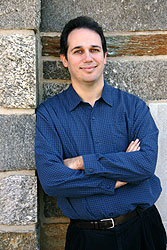
Lorne Ladner
“Among Western psychotherapists, there’s been a long debate about the value of a ‘healthy ego’ for those striving to practice the Dharma,” writes Lorne Ladner. “One of the functions of the ego is to help us to fit into society – to be well adjusted to the world around us. Freud explained that the ego’s job is to modulate our powerful, instinctual impulses, helping us to meet as many of our desires as we can while also not harming others, not breaking the rules of our society, and perhaps contributing something to those around us. From an ego-centered perspective, mental health could be described as fulfilling as many of your own desires as possible while also finding your place in society, not harming others around you, and perhaps helping others also to fulfill their desires. The ego lives in the realm of desire.”
Does “sanity” look the same from the perspectives of Dharma and contemporary psychology? What does it mean to be “well adjusted?” Read the entire article by Dr. Lorne Ladner and let us know what you think.
From Mandala October-November 2004.
- Tagged: dharma in the modern world, lorne ladner, mandala, psychology
- 0
26
Word Power: A Journo’s Story, Adele Hulse talks about writing and Lama Yeshe

Adele Hulse
“Back in 1976 Lama Yeshe called me up to his house at Chenrezig Institute in Australia and said: ‘You. You writer. You good understand my language. I want you write por me. You take Chenrezig teaching notes here and make book.’ Lama Yeshe couldn’t say his ‘f’s,’” writes Adele Hulse.
“I spent the next year in a caravan in the mountains rearranging Lama’s ‘language’ into what later became a Wisdom Publications booklet. I loved living alone in the mountains but realized there was more I had to do for Lama, so I moved to Melbourne and began importing books from the Tibetan Library – there were very few Dharma books available in English. This went on for some years and I wondered again about ‘writing por Lama’. How?”
- Tagged: adele hulse, mandala, your community
- 0
24
Meher Baba Clearly Told Me in a Dream, the story of Ven. Thubten Wongmo

Feather Meston with son Daja Wangchuk, 1973.
“The only explanation that makes any sense as to how I ended up walking up the hill to Kopan in 1973,” writes Ven. Thubten Wongmo (Feather Meston), “is that the walk up that path actually began in various past lives. I mean, think about it. How else would a young, nice-enough-looking social worker turned hippie gal from a rather famous Jewish Hollywood family possibly end up at a Tibetan Buddhist monastery in Nepal? Traveling with her bearded Jewish hippie-artist-poet ex-husband and two-year-old son. But of course, it’s different these days … anyone who knows anything eventually finds Kopan and takes a meditation course, preferably the famous annual November course.”
Read her complete story of her travels through Europe and Asia, her star-studded family, and the dream that brought her to Kopan Monastery in Nepal.
- Tagged: mandala, ven. thubten wongmo, your community
- 0
22
FPMT News Around the World
In addition to back issues of Mandala magazine, our archive includes the two issues of Mandala‘s predecessor, Wisdom. Published in 1983-1984 by Wisdom Publications, the magazine is a valuable record of FMPT activities in the early 1980s.
Wisdom No. 2, published in late 1984, shares an extensive and heart-felt tribute to Lama Yeshe, who passed away in March 1984. Over the course of 30 pages, Lama Yeshe is remembered by his students and teachers through stories, teachings, poems and articles.
Also remembered in this issue are Ling Rinpoche, Tsenshab Serkong Rinopche and Song Rinpoche, who passed away in December 1983, August 1983 and November 1984 respectively.
In addition, Wisdom No. 2 shares a profile of Lama Zopa Rinpoche in his new role as the sole spiritual director of FPMT as well as an interview with Geshe Jampa Gyatso, who served as resident teacher at Istituto Lama Tzong Khapa in Italy.
Wisdom No. 1, published in May 1983, features story on His Holiness the Dalai Lama’s 1983 European tour, organized by FPMT; Lama Yeshe’s visit to Tibet; and news from FPMT centers around the world.
- Tagged: fpmt history, lama yeshe, mandala, wisdom
- 0
19
Mandala eZine December 2011 Re-released!
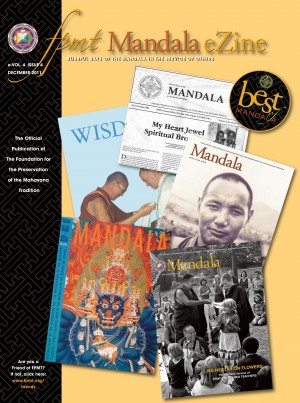
Cover of Mandala eZine December 2011
Mandala Publications is happy re-release the December 2011 eZine, the last of our 13-issue eZine collection.
The eZine was launched in December 2008 to give Friends of FPMT new ways of engaging with qualified teachers, illuminating teachings, FPMT news and community connections – all part of Mandala’s legacy.
The December 2011 eZine was the third of our “Best of Mandala” special issue, and features stories spanning from 1983 to 2009. Read about Lama Yeshe’s first trip to Tibet after being forced into exile, a beautiful account from Lama Zopa Rinpoche’s attendant and FPMT CEO Ven. Roger Kunsang illustrating Rinpoche’s tireless compassionate action, Ven. Pende Hawter’s discussion with several high lamas about life and death, and a retelling of Lama Yehse’s passing in March 1984. This issue also contains hard-to-find links to video and audio teachings from Lama Yeshe, Ven. René Fesui, Ven. Karin Valham, and Jan Willis.
All our eZines will be re-released over the next few months. We’re happy to rejoice again in this amazing collection of teachings, stories, and resources – we hope you’ll “re-enjoy” it, too!
12
Jetsünma Tenzin Palmo on the ‘Genuine Teacher’
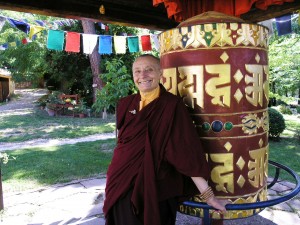
Jetsünma Tenzin Palmo
Meditator, teacher, and founder of Dongyu Gatsal Ling, a nunnery in the Drukpa Kagyu lineage in Tashi Jong, India, Ven. Tenzin Palmo [now, Jetsünma Tenzin Palmo] found her perfect teacher, His Eminence the eighth Khamtrul Rinpoche in India, 1964. In this extract from Reflections on a Mountain Lake: Teachings on Practical Buddhism [Snow Lion Publications, July 2002] she spiritedly reflects on the role of the spiritual master with particular reference to the Vajrayana path.
In the Vajrayana, or Tantric, school, the guru plays an extremely pivotal role. I think there are two principal reasons for this. Firstly, a genuine teacher, or guru, is the one who reveals to us the empty, aware, clear nature of the primordial mind, our inherent wisdom and compassion. This, the mind’s unconditioned nature, is always with us [and] is the most fundamental aspect of our being. However, it is very difficult for us to gain access to this without help. We need a teacher who can create the psychological circumstances for us to glimpse this inherent nature. So a true guru is the one who shows us the nature of the mind. He or she is therefore an extremely important person in our lives.
From Mandala June-August 2002.
- Tagged: mandala, teachings and advice
- 0
11
Review: Insight into Emptiness
This book may well become a classic introduction to the topic of emptiness for serious students of Tibetan Buddhism. You can read the entire review online as part of this issue’s online content.
10
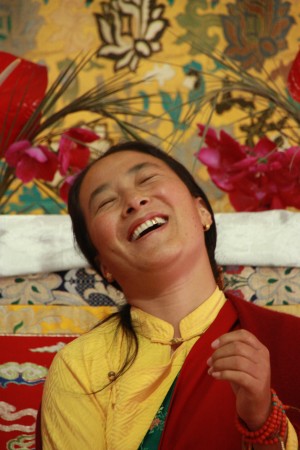
Khadro-la durante el retiro en el Monasterio de Nalanda, Francia. Agosto de 2011. Foto cortesía del Monasterio de Nalanda.
Rangjung Neljorma Khadro Namsel Drönme es el título formal de Khadro-la, “Rangjung Neljorma” es el nombre que Su Santidad le dio y significa “yogini natural, auto-generada”. Khadro-la fue presentada a la comunidad internacional de la FPMT a través de una entrevista con el Ven. Roger Kunsang, asistente de Lama Zopa Rimpoché y CEO de la FPMT. La entrevista titulada “Entrevista con una Dakini” fue publicada en la revista Mandala de Enero-Marzo de 2009.
En junio cuando Khadro-la estaba de visita en la Oficina Internacional de la FPMT en Portland, aceptó una segunda entrevista con la revista Mandala. Laura Miller, Gerente Editorial le solicitó a Khadro-la que hablara sobre su servicio y conexión con Lama Zopa Rinpoche, que brindara algunos consejos a las practicantes femeninas y que compartiera sus ideas para el desarrollo de la FPMT. Compartimos esta entrevista con la esperanza de que muchos se inspiren por el sincero y profundo compromiso de Khadro-la no solo hacia el Dalai Lama, sino también en la difusión del Dharma.
De Mandala Octubre-Diciembre 2012.
- Tagged: khandro kunga bhuma, mandala, spanish
- 0
5
Meet Geshe Ngawang Sonam: Hayagriva Buddhist Centre’s New Resident Teacher
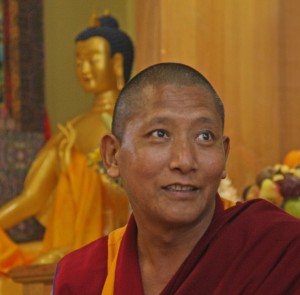
Geshe Ngawang Sonam. Photo from http://hayagriva.org.au/
Hayagriva Buddhist Centre in Perth, Australia, recently welcomed Geshe Ngawang Sonam as resident teacher. To introduce Geshe Sonam to the FPMT community, the center offers a video interview, in which Geshe Sonam, who was born in 1963 in Tibet, shares stories from his life and reflections on his years at Sera Je Monastery as well as talks about his relationship with his mother.
At age 5, Geshe Sonam, with only his two older brothers and parents, fled Tibet over the mountains to India. He was ordained as a monk at age 10. In 1995, after 22 years of study at the famous Sera Je Monastery in Bylakuppe, Mysore, India, Ven. Sonam was awarded the prestigious academic title of Geshe (equivalent to a graduate level degree in Buddhist philosophy). The Geshe degree requires the ongoing demonstration of complete knowledge of the five major treatises: the Perfection of Wisdom (as elaborated upon by Maitreya in the Abhisamayalamkara); Chandrakirti’s commentary on Nagarjuna’s root text on Madhyamaka; Dharmakirti’s Pramanavartika – Compendium on Valid Cognition; Vasubhandu’s Abhidharmakosha; and Vinaya – studies in monastic discipline.
Find the video interview with Geshe Ngawang Sonam on fpmt.org/mandala/.
- Tagged: geshe ngawang sonam, interview, mandala, your community
- 0
4
Vegetarianism: A Healthy Debate
Two renowned teachers in the Tibetan Buddhist tradition, Ven. Sangye Khadro, author of the best-selling book How to Meditate, and Ven. Robina Courtin, founder of Liberation Prison Project and former editor of Mandala, offer their thoughts on vegetarianism within Buddhist circles …
“There is a lot of debate within Buddhism about this issue. There are some Buddhists who are vegetarian (no meat or fish), and some who are vegans (no animal products at all, including dairy products and eggs). And there are some Buddhists who eat meat.
What did the Buddha himself say about eating meat? Well, it seems that he said different things at different times. This may sound like he contradicted himself, but the Tibetans say that the Buddha was a very skillful teacher who understood the minds and needs of his listeners and would teach them accordingly. So to some, the Buddha said it was okay to eat meat, provided that they did not kill the animal themselves, or order it to be killed. But to others, the Buddha said that if you are a follower of the bodhisattva path, and truly compassionate, you should not eat meat, and spoke of the harmful consequences of doing so…”
From Mandala June-July 2007
3
FPMT Around the World
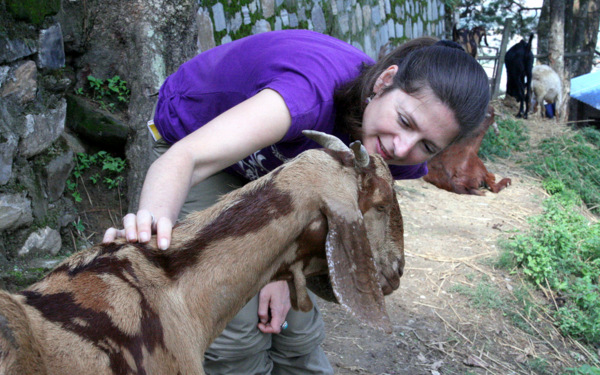
Enlightenment for the Dear Animals' Tania Duratovic and Nyingje, who was rescued from death, at the Animal Liberation Sanctuary, Nepal
October 4 is World Animal Day. Many FPMT students and centers are doing things to benefit animals. If you’d like to do something to help, Enlightenment for the Dear Animals shares the following ideas:

Sangpo, meaning "good hearted," rescued from a pound, and recently re-homed at Kunsang Yeshe Centre, Blue Mountains, Australia
- Go to a local animal shelter and adopt a pet and give it a home and Dharma for the rest of its life;
- If you can’t actually re-home an animal, you can visit a shelter and (perhaps surreptitiously) recite texts and mantras;
- Join your local Dharma center for a pet blessing;
- Recite many mantras, blow on water and then sprinkle or spray the water on insects and animals around your house;
- Sponsor a rescued animal (such as a goat at the Animal Liberation Sanctuary, Nepal, or a dog at MAITRI Charitable Trust, India);
- Change your diet and lifestyle to reduce the market for harming animals — go vegetarian, go vegan, give up fur products, promote non-meat meals for functions at family and work celebrations.
“World Animal Day commemorates St. Francis of Assisi, patron saint of animals and the environment. He saw the suffering of animals and did not turn a blind eye to their misery,” EFDA writes. “Our own kind Lama Zopa Rinpoche [spiritual director of FPMT] is a most incredible inspiration in showing us how we can actually benefit these sentient beings caught in the lower realms. For this day, at least, we can do prayers and practices specifically dedicated for them.”
To learn more, visit the World Animal Day webpage.
With 158 centers, projects and services around the globe, there is always news on FPMT activities, teachers and events. Mandala hopes to share as many of these timely stories as possible. If you have news you would like to share, please let us know.
If you like what you read on Mandala, consider becoming a Friend of FPMT, which supports our work.
- Home
- News/Media
- Study & Practice
- About FPMT Education Services
- Latest News
- Programs
- New to Buddhism?
- Buddhist Mind Science: Activating Your Potential
- Heart Advice for Death and Dying
- Discovering Buddhism
- Living in the Path
- Exploring Buddhism
- FPMT Basic Program
- FPMT Masters Program
- FPMT In-Depth Meditation Training
- Maitripa College
- Lotsawa Rinchen Zangpo Translator Program
- Universal Education for Compassion & Wisdom
- Online Learning Center
- Prayers & Practice Materials
- Overview of Prayers & Practices
- Full Catalogue of Prayers & Practice Materials
- Explore Popular Topics
- Benefiting Animals
- Chenrezig Resources
- Death & Dying Resources
- Lama Chopa (Guru Puja)
- Lama Zopa Rinpoche: Compendium of Precious Instructions
- Lama Zopa Rinpoche: Life Practice Advice
- Lama Zopa Rinpoche Practice Series
- Lamrim Resources
- Mantras
- Prayer Book Updates
- Purification Practices
- Sutras
- Thought Transformation (Lojong)
- Audio Materials
- Dharma Dates – Tibetan Calendar
- Translation Services
- Publishing Services
- Teachings and Advice
- Find Teachings and Advice
- Lama Zopa Rinpoche Advice Page
- Lama Zopa Rinpoche: Compendium of Precious Instructions
- Lama Zopa Rinpoche Video Teachings
- ༧སྐྱབས་རྗེ་བཟོད་པ་རིན་པོ་ཆེ་མཆོག་ནས་སྩལ་བའི་བཀའ་སློབ་བརྙན་འཕྲིན།
- Podcasts
- Lama Yeshe Wisdom Archive
- Buddhism FAQ
- Dharma for Young People
- Resources on Holy Objects
- Ways to Offer Support
- Centers
- Affiliates Area
- Teachers
- Projects
- Charitable Projects
- Make a Donation
- Applying for Grants
- News about Projects
- Other Projects within FPMT
- Support International Office
- Projects Photo Galleries
- Give Where Most Needed
- FPMT
- Shop
Subscribe to FPMT News
Translate*
*powered by Google TranslateTranslation of pages on fpmt.org is performed by Google Translate, a third party service which FPMT has no control over. The service provides automated computer translations that are only an approximation of the websites' original content. The translations should not be considered exact and only used as a rough guide.Realize that the nature of your mind is different from that of the flesh and bone of your physical body. Your mind is like a mirror, reflecting everything without discrimination. If you have understanding-wisdom, you can control the kind of reflection that you allow into the mirror of your mind.









